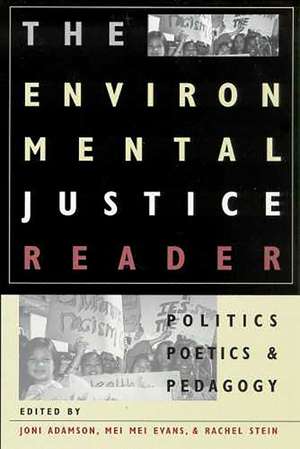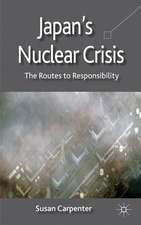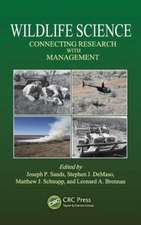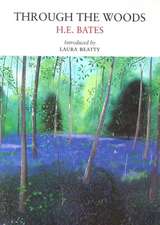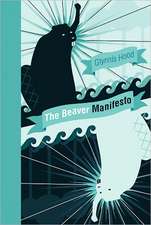The Environmental Justice Reader: Politics, Poetics, and Pedagogy
Editat de Joni Adamson, Mei Mei Evans, Rachel Steinen Limba Engleză Paperback – noi 2002
From the First National People of Color Congress on Environmental Leadership to WTO street protests of the new millennium, environmental justice activists have challenged the mainstream movement by linking social inequalities to the uneven distribution of environmental dangers. Grassroots movements in poor communities and communities of color strive to protect neighborhoods and worksites from environmental degradation and struggle to gain equal access to the natural resources that sustain their cultures.
This book examines environmental justice in its social, economic, political, and cultural dimensions in both local and global contexts, with special attention paid to intersections of race, gender, and class inequality. The first book to link political studies, literary analysis, and teaching strategies, it offers a multivocal approach that combines perspectives from organizations such as the Southwest Network for Environmental and Economic Justice and the International Indigenous Treaty Council with the insights of such notable scholars as Devon Peña, Giovanna Di Chiro, and Valerie Kuletz, and also includes a range of newer voices in the field.
This collection approaches environmental justice concerns from diverse geographical, ethnic, and disciplinary perspectives, always viewing environmental issues as integral to problems of social inequality and oppression. It offers new case studies of native Alaskans' protests over radiation poisoning; Hispanos' struggles to protect their land and water rights; Pacific Islanders' resistance to nuclear weapons testing and nuclear waste storage; and the efforts of women employees of maquiladoras to obtain safer living and working environments along the U.S.-Mexican border.
The selections also include cultural analyses of environmental justice arts, such as community art and greening projects in inner-city Baltimore, and literary analyses of writers such as Jimmy Santiago Baca, Linda Hogan, Barbara Neely, Nez Perce orators, Ken Saro-Wiwa, and Karen Yamashita—artists who address issues such as toxicity and cancer, lead poisoning of urban African American communities, and Native American struggles to remove dams and save salmon. The book closes with a section of essays that offer models to teachers hoping to incorporate these issues and texts into their classrooms. By combining this array of perspectives, this book makes the field of environmental justice more accessible to scholars, students, and concerned readers.
This book examines environmental justice in its social, economic, political, and cultural dimensions in both local and global contexts, with special attention paid to intersections of race, gender, and class inequality. The first book to link political studies, literary analysis, and teaching strategies, it offers a multivocal approach that combines perspectives from organizations such as the Southwest Network for Environmental and Economic Justice and the International Indigenous Treaty Council with the insights of such notable scholars as Devon Peña, Giovanna Di Chiro, and Valerie Kuletz, and also includes a range of newer voices in the field.
This collection approaches environmental justice concerns from diverse geographical, ethnic, and disciplinary perspectives, always viewing environmental issues as integral to problems of social inequality and oppression. It offers new case studies of native Alaskans' protests over radiation poisoning; Hispanos' struggles to protect their land and water rights; Pacific Islanders' resistance to nuclear weapons testing and nuclear waste storage; and the efforts of women employees of maquiladoras to obtain safer living and working environments along the U.S.-Mexican border.
The selections also include cultural analyses of environmental justice arts, such as community art and greening projects in inner-city Baltimore, and literary analyses of writers such as Jimmy Santiago Baca, Linda Hogan, Barbara Neely, Nez Perce orators, Ken Saro-Wiwa, and Karen Yamashita—artists who address issues such as toxicity and cancer, lead poisoning of urban African American communities, and Native American struggles to remove dams and save salmon. The book closes with a section of essays that offer models to teachers hoping to incorporate these issues and texts into their classrooms. By combining this array of perspectives, this book makes the field of environmental justice more accessible to scholars, students, and concerned readers.
Preț: 306.95 lei
Nou
Puncte Express: 460
Preț estimativ în valută:
58.73€ • 61.49$ • 48.60£
58.73€ • 61.49$ • 48.60£
Carte tipărită la comandă
Livrare economică 07-21 aprilie
Preluare comenzi: 021 569.72.76
Specificații
ISBN-13: 9780816522071
ISBN-10: 0816522073
Pagini: 405
Ilustrații: 9 b&w illustrations, 1 table
Dimensiuni: 152 x 229 x 25 mm
Greutate: 0.63 kg
Ediția:2
Editura: University of Arizona Press
Colecția University of Arizona Press
ISBN-10: 0816522073
Pagini: 405
Ilustrații: 9 b&w illustrations, 1 table
Dimensiuni: 152 x 229 x 25 mm
Greutate: 0.63 kg
Ediția:2
Editura: University of Arizona Press
Colecția University of Arizona Press
Notă biografică
Joni Adamson is Associate Professor of American Literature and Folklore at the south campus of the University of Arizona. Her essays on Native American literature have appeared in Studies in American Indian Literatures and in Reading the Earth: New Directions in the Study of Literature and the Environment. Mei Mei Evans is Assistant Professor of English and Director of the Master of Arts degree program at Alaska Pacific University. A published fiction writer and longtime activist, she was the statewide coordinator of the Oil Reform Alliance.
Cuprins
Acknowledgments
Introduction: Environmental Justice Politics, Poetics, and Pedagogy
Joni Adamson, Mei Mei Evans, and Rachel Stein
Environmental Justice: A Roundtable Discussion with Simon Ortiz, Teresa Leal, Devon Peña, and Terrell Dixon
Joni Adamson and Rachel Stein
POLITICS
1 Testimonies
Mei Mei Evans
Statement from Doris Bradshaw
Statement from Sterling Gologergen
Statement from Edgar Mouton
Statement from Alberto Saldamando
Statement from Paul Smith
2 Throwing Rocks at the Sun: An Interview with Teresa Leal
Joni Adamson
3 Endangered Landscapes and Disappearing Peoples? Identity, Place, and Community in Ecological Politics
Devon G. Peña
4 Who Hears Their Cry? African American Women and the Fight for Environmental Justice in Memphis, Tennessee
Andrea Simpson
5 Radiation, Tobacco, and Illness in Point Hope, Alaska: Approaches to the ‘‘Facts’’ in Contaminated Communities
Nelta Edwards
6 The Movement for Environmental Justice in the Pacific Islands
Valerie Kuletz
POETICS
7 Toward an Environmental Justice Ecocriticism
T. V. Reed
8 From Environmental Justice Literature to the Literature of Environmental Justice
Julie Sze
9 ‘‘Nature’’ and Environmental Justice
Mei Mei Evans
10 Activism as Affirmation: Gender and Environmental Justice in Linda Hogan’s Solar Storms and Barbara Neely’s Blanche Cleans Up
Rachel Stein
11 Some Live More Downstream than Others: Cancer, Gender, and Environmental Justice
Jim Tarter
12 Struggle in Ogoniland: Ken Saro-Wiwa and the Cultural Politics of Environmental Justice
Susan Comfort
13 Toward a Symbiosis of Ecology and Justice: Water and Land Conflicts in Frank Waters, John Nichols, and Jimmy Santiago Baca
Tom Lynch
14 Saving the Salmon, Saving the People: Environmental Justice and Columbia River Tribal Literatures
Janis Johnson
15 Sustaining the ‘‘Urban Forest’’ and Creating Landscapes of Hope: An Interview with Cinder Hypki and Bryant ‘‘Spoon’’ Smith
Giovanna Di Chiro
PEDAGOGY
16 Teaching for Transformation: Lessons from Environmental Justice
Robert Figueroa
17 Notes on Cross-Border Environmental Justice Education
Soenke Zehle
18 Changing the Nature of Environmental Studies: Teaching Environmental Justice to ‘‘Mainstream’’ Students
Steve Chase
19 Teaching Literature of Environmental Justice in an Advanced Gender Studies Course
Jia-Yi Cheng-Levine
Source Acknowledgments
Contributors
Index
Introduction: Environmental Justice Politics, Poetics, and Pedagogy
Joni Adamson, Mei Mei Evans, and Rachel Stein
Environmental Justice: A Roundtable Discussion with Simon Ortiz, Teresa Leal, Devon Peña, and Terrell Dixon
Joni Adamson and Rachel Stein
POLITICS
1 Testimonies
Mei Mei Evans
Statement from Doris Bradshaw
Statement from Sterling Gologergen
Statement from Edgar Mouton
Statement from Alberto Saldamando
Statement from Paul Smith
2 Throwing Rocks at the Sun: An Interview with Teresa Leal
Joni Adamson
3 Endangered Landscapes and Disappearing Peoples? Identity, Place, and Community in Ecological Politics
Devon G. Peña
4 Who Hears Their Cry? African American Women and the Fight for Environmental Justice in Memphis, Tennessee
Andrea Simpson
5 Radiation, Tobacco, and Illness in Point Hope, Alaska: Approaches to the ‘‘Facts’’ in Contaminated Communities
Nelta Edwards
6 The Movement for Environmental Justice in the Pacific Islands
Valerie Kuletz
POETICS
7 Toward an Environmental Justice Ecocriticism
T. V. Reed
8 From Environmental Justice Literature to the Literature of Environmental Justice
Julie Sze
9 ‘‘Nature’’ and Environmental Justice
Mei Mei Evans
10 Activism as Affirmation: Gender and Environmental Justice in Linda Hogan’s Solar Storms and Barbara Neely’s Blanche Cleans Up
Rachel Stein
11 Some Live More Downstream than Others: Cancer, Gender, and Environmental Justice
Jim Tarter
12 Struggle in Ogoniland: Ken Saro-Wiwa and the Cultural Politics of Environmental Justice
Susan Comfort
13 Toward a Symbiosis of Ecology and Justice: Water and Land Conflicts in Frank Waters, John Nichols, and Jimmy Santiago Baca
Tom Lynch
14 Saving the Salmon, Saving the People: Environmental Justice and Columbia River Tribal Literatures
Janis Johnson
15 Sustaining the ‘‘Urban Forest’’ and Creating Landscapes of Hope: An Interview with Cinder Hypki and Bryant ‘‘Spoon’’ Smith
Giovanna Di Chiro
PEDAGOGY
16 Teaching for Transformation: Lessons from Environmental Justice
Robert Figueroa
17 Notes on Cross-Border Environmental Justice Education
Soenke Zehle
18 Changing the Nature of Environmental Studies: Teaching Environmental Justice to ‘‘Mainstream’’ Students
Steve Chase
19 Teaching Literature of Environmental Justice in an Advanced Gender Studies Course
Jia-Yi Cheng-Levine
Source Acknowledgments
Contributors
Index
Recenzii
"Brings environmental issues home and expands on ideas about justice with hope and possibilities for change." —Voices from the Earth
"This diverse collection of interdisciplinary readings offers a sense of the breadth of the evolving environmental justice movement. . . . The editors weave a disparity of personal voices into a narrative that builds on previous works on environmental inequity and speaks of the realities of the political aspects of environmental versus corporate issues, analyzes literature for environmental justice concerns, and shares stories of the difficulties involved in teaching, informing, and advocating for this multidimensional cause. Recommended for all levels." —Choice
"Offers a realistic and fresh look at the interlocked problems and problem-solving approaches to exploitation of land and of disenfranchised people. Although introducing the global scope of the problem, it also shows that communities working to solve environmental problems develop new skills, creativity, and powerful voices." —Bulletin of Science, Technology Society"
A valuable contribution . . . The closing chapters . . . will also be helpful for the next generation of environmental justice humanities scholars as they look to achieve the delicate balance of authenticity of voice and the artistic expression of that voice." —Environment
"This reader is, more than anything else, an effort to counter fear and uncertainty. It portrays activists winning battles, artists inspiring children, teachers begetting new activists. In the process, it takes the edges of the issue of environmental racism and stretches them. . . . This reader's nineteen essays are not restricted to any one group or to the United States only, and include many fresh and diverse voices. That is its strength." —Electronic Green Journal
"This diverse collection of interdisciplinary readings offers a sense of the breadth of the evolving environmental justice movement. . . . The editors weave a disparity of personal voices into a narrative that builds on previous works on environmental inequity and speaks of the realities of the political aspects of environmental versus corporate issues, analyzes literature for environmental justice concerns, and shares stories of the difficulties involved in teaching, informing, and advocating for this multidimensional cause. Recommended for all levels." —Choice
"Offers a realistic and fresh look at the interlocked problems and problem-solving approaches to exploitation of land and of disenfranchised people. Although introducing the global scope of the problem, it also shows that communities working to solve environmental problems develop new skills, creativity, and powerful voices." —Bulletin of Science, Technology Society"
A valuable contribution . . . The closing chapters . . . will also be helpful for the next generation of environmental justice humanities scholars as they look to achieve the delicate balance of authenticity of voice and the artistic expression of that voice." —Environment
"This reader is, more than anything else, an effort to counter fear and uncertainty. It portrays activists winning battles, artists inspiring children, teachers begetting new activists. In the process, it takes the edges of the issue of environmental racism and stretches them. . . . This reader's nineteen essays are not restricted to any one group or to the United States only, and include many fresh and diverse voices. That is its strength." —Electronic Green Journal
